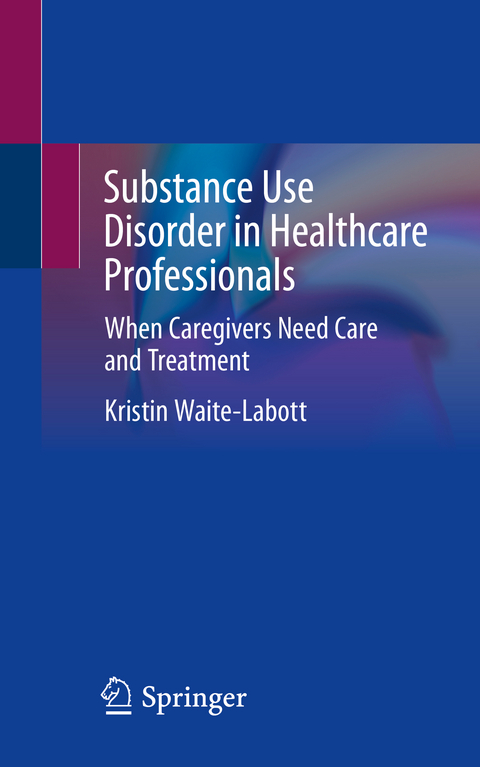
Substance Use Disorder in Healthcare Professionals
Springer International Publishing (Verlag)
978-3-031-09989-2 (ISBN)
This book develops on substance use disorder in healthcare workers, a topic not often discussed. While the phenomena is nothing new, the desire to learn about it is. This book describes why substance use disorder occurs in healthcare workers, explains how to recognize substance use disorder in peers and how to care for them. It discusses the barriers to seeking treatment, provides different monitoring programs and disciplinary actions, and educates on the recovery and how those with long term recovery maintain it. This book also intends to decrease stigmatizing behaviors. While the main focus is nursing, this book can be helpful to any healthcare professional group. Dr Carmel Clancy, President of the International Nurses Society on Addictions (IntNSA), did us the honor of writing the Foreword.
Kristin Waite-Labott is a Registered Nurse and has worked with substance use disorders for 15 years in many different settings. She earned her BSN degree from Winona State University in 1991, and is currently the head nurse coach for Veritus, a virtual treatment program for medical professionals with substance use disorder. She is the Interim President of the International Nurses Society on Addictions (IntNSA) USA and is President of the Eastern Wisconsin IntNSA Chapter. In 2005 she lost almost everything to her alcohol and opioid use disorders. None of her family, friends, or co-workers knew that she was using drugs, not until she was fired from her job and arrested. She has been clean and sober since that time. She now works as a nurse recovery coach, an emergency room nurse, writes a blog on issues surrounding recovery from substances and works with others who struggle with substances. Her goal is to increase awareness about the problem of substance use disorder in healthcare.
Chapter 1. Healthcare Workers and Substance Use DisorderThis chapter will discuss the current state of Healthcare Workers and Substance Use Disorder (SUD) including statistics on the scope of the problem. It will also include information on the current state of the opioid crisis in the public. There will also be discussion addressing the stigma that often accompanies SUD both from the perspective of the healthcare worker with SUD and general stigma from the healthcare industry itself.
Chapter 2.Why Substance Use Disorder Occurs in Healthcare WorkersThis chapter will describe the attributes in Healthcare Workers with SUD that make them more vulnerable to a SUD.
Chapter 3. Signs of Substance Use in Healthcare WorkersThis chapter will analyze the signs that may indicate a healthcare worker is using substances. There will also be information on what to do if substance use is suspected.
Chapter 4. Monitoring Programs, Disciplinary Action, and Alternative to Discipline ProgramsThis chapter will explain different monitoring programs and disciplinary actions that can be utilized for healthcare workers with SUD, including alternative to discipline programs (ADPs).
Chapter 5. Barriers to Seeking Treatment and Re-entry to the WorkforceThis chapter will discuss barriers to seeking treatment often encountered by healthcare workers with SUD, as well as by those trying to help, including family, managers and others in administration. Recommendations on how those with SUD can return to the workforce safely will be reviewed.
Chapter 6. Diversion PreventionThis chapter will examine successful diversion prevention practices and discuss how to implement them.
Chapter 7. Medication Assisted Treatment (MAT)This chapter will define what MAT is and provide examples of successful programs.
Chapter 8. What Recovery Looks LikeThis chapter will summarize recovery programs that are utilized by people with SUD. From jails to inpatient, expensive to free, and controversial to accepted, different program types will be explored.
| Erscheinungsdatum | 14.09.2022 |
|---|---|
| Zusatzinfo | XIX, 119 p. 174 illus., 129 illus. in color. |
| Verlagsort | Cham |
| Sprache | englisch |
| Maße | 127 x 203 mm |
| Gewicht | 159 g |
| Themenwelt | Geisteswissenschaften ► Psychologie ► Klinische Psychologie |
| Medizin / Pharmazie ► Gesundheitswesen | |
| Medizin / Pharmazie ► Pflege | |
| Wirtschaft | |
| Schlagworte | addiction • Diversion • Drug use • healthcare workers • Nurse ubstance use • Recovery |
| ISBN-10 | 3-031-09989-3 / 3031099893 |
| ISBN-13 | 978-3-031-09989-2 / 9783031099892 |
| Zustand | Neuware |
| Haben Sie eine Frage zum Produkt? |
aus dem Bereich


